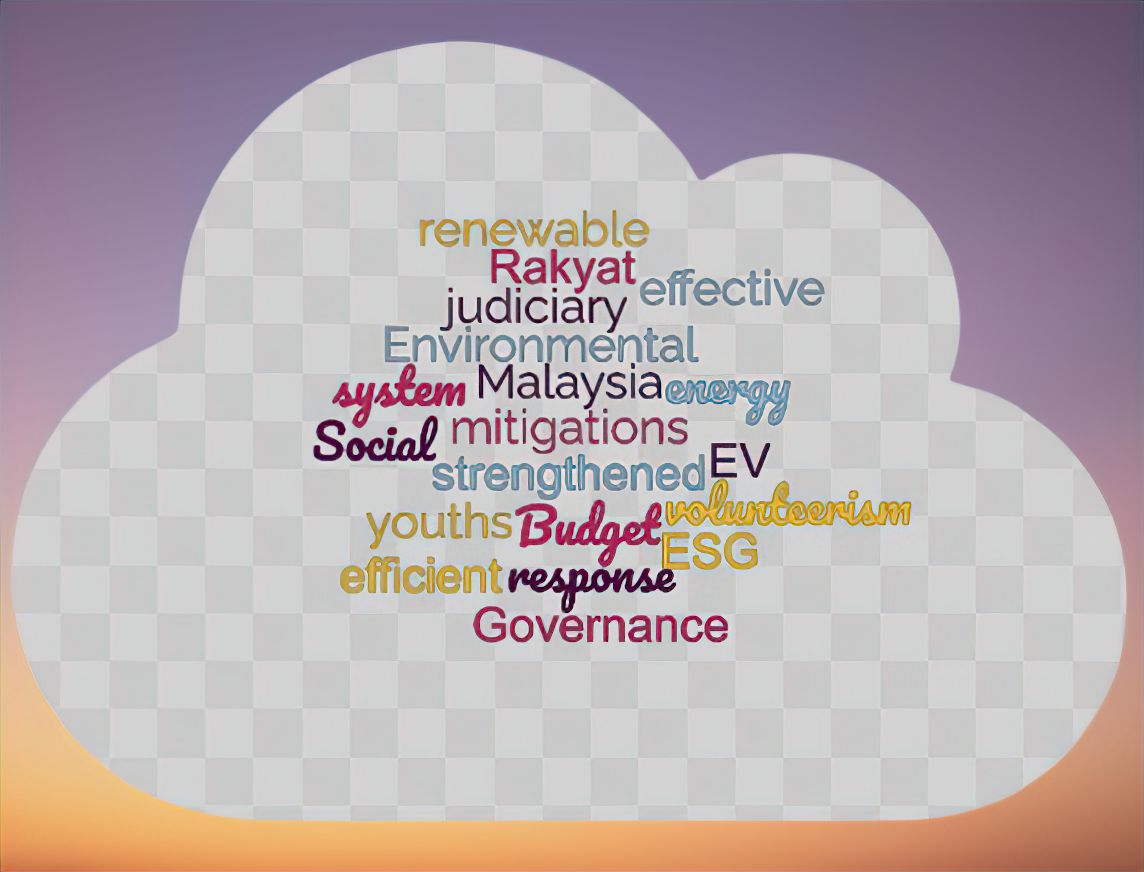

On 11 April 2023, the Malaysian
government has announced that a formal Environmental, Social, and Governance
(ESG) framework/standards will be introduced by the end of 2023. This ESG
framework aims to assist micro, small and medium enterprises (MSMEs) which
recorded a remarkable Gross Domestic Product (GDP) growth in 2022 at 11.6%,
which surpasses the overall national GDP growth of 8.7%, and contributed a
total of 38.4% (equivalent to RM580.4 billion) to Malaysia’s GDP in 2022, in
relation to funding and capacity building, and also to support Malaysia’s
transition to renewable energy.
Budget 2024, with the
theme “Budget 2024: Economic Reforms, Empowering the People” which was
tabled by the Prime Minister and Minister of Finance, YAB Dato’ Seri Anwar
Bin Ibrahim at Dewan Rakyat in Kuala Lumpur on 13 October 2023, demonstrates
that the Government
agrees to continue providing electricity bill rebates of up to RM40 per
month to hardcore poor households (i.e. households with Pendapatan Garis
Kemiskinan (PGKs) monthly income of less than RM1,169 while those in
absolute poverty had a monthly income of less than RM2,208) with an
allocation of RM55 million. In addition, the Government also agrees to waive
the deposit payment of electricity bill in their own names.
Recognizing that the Judiciary System
is an independent institution that protects and safeguards the sovereignty
of the law and the sanctity of the Federal Constitution,
Budget 2024 allocates a total of RM38 million to
increase the productivity of Malaysia’s judicial institutions by giving
priority to refurbish infrastructure as well as to upgrade the Information
and Communications Technology (ICT) facilities in the courts that are
damaged and obsolete. This allocation also includes channelling RM20 million
to empower the Academy of Syariah Judiciary Malaysia and the Academy of
Judiciary Malaysia to train judges of the upper/superior courts (i.e.
the High Court, Court of Appeal, and the Federal Court) in a more planned,
efficient and effective manner.
Besides this, in order to address the
various socio-economic issues faced by the Rakyat, through Budget 2024, the
Government has allocated a total of RM100 million to continue supporting the
efforts and initiatives carried out by Non-Governmental Organizations (NGOs)
that are established to work toward public or social welfare goals, as well
as civil society organisations such as Yayasan Hasanah.
Furthermore, the Government has
allocated a total of RM20 million (a RM10 million increase from the original
RM10 million) to the National Scam Response Centre (NSRC) to further improve
the functionality of the NSRC to combat cyber frauds and scam related
crimes. The operation of NSRC is a joint effort among the anti-financial
crime centre (NFCC), police, Bank Negara Malaysia (BNM), Malaysian
Communications and Multimedia Commission (MCMC), financial institutions and
telecommunications companies. To date, the NSRC has handled more than 49,000
calls and successfully frozen up to RM60 million in transactions since its
establishment on 14 October 2022.
The Government has provided a tax
relief of up to RM2,000 as payment for skills improvement or
self-improvement courses to encourage Malaysians to enhance and develop new
skills. This tax relief is extended until the Year of Assessment 2026.
Furthermore, the Government will also expand the scope for lifestyle relief
(a personal income tax relief) to include the fees for attending
self-improvement courses such as photography, tailoring classes, language
courses and others.
Regarding the Sustainable Agenda and
Energy Transition, the Government has launched the National Energy
Transition Roadmap (NETR) which outlines 6 key drivers of energy transition,
including hydrogen, green mobility, renewable energy, as well as carbon
capture utilisation and storage (CCUS) on 27 July 2023. Budget 2024 has
allocated RM2 billion to facilitate the National Energy Transition in order
to realise the NETR aspiration and also to achieve the Net Zero Carbon
Emission. Besides this, financial institutions will also provide financing
funds with accumulated value of RM200 billion to encourage the industry to
evolve towards a low-carbon economy. The Government will continue to
intensify efforts and initiatives to improve the implementation of the
Corporate Green Power Programme as one of the implementation methods of the
Third Party Access (TPA) model towards achieving the target of 70% renewable
energy capacity by 2050.
Besides this, the Government will
continue to boost growth in the electric vehicle industry (EV) in Malaysia
and encourage Malaysians’ acceptance of the usage of EVs. The Government’s
initiatives include over RM170 million of investments by leading companies
such as Tenaga Nasional Berhad (TNB), Gentari Sdn Bhd (a subsidiary of
PETRONAS) and Tesla Malaysia to install 180 EV charging stations throughout
Malaysia. The Government will introduce the Electric Motorcycle Usage
Incentive Scheme to Malaysians with an annual income of below RM120,000 to
encourage the use of electric motorcycles. This scheme will provide up to
RM2,400 rebate to buyers. In addition, Prasarana Malaysia Berhad has agreed
to acquire 150 electric buses and build 3 bus depots at a cost of RM600
million to support the needs of the LRT3 projects. On top of this, the
Government proposes to extend the personal income tax relief of up to
RM2,500 on expenses for EV charging facilities for a period of 4 years and
to extend the tax deduction for EV rental costs for a period of 2 years.
To preserve natural treasures and to
support the state governments’ efforts in protecting endangered wildlife
such as elephants, tigers and tapirs, besides increasing the percentage of
protected forest areas, Budget 2024 sees an allocation of RM200 million
(RM50 million up from the original RM150 million) for Ecological Fiscal
Transfer for Biodiversity Conservation (EFT). Besides this, the Government
will extend the tax exemption application period on all social enterprises
income until 2025 to support the social enterprises’ movements in producing
positive environmental and social impacts that are in line with the pillars
of sustainability (i.e. economy, environmental and social aspects) and
well-being under Malaysia MADANI.
Budget 2024 also sees an allocation of
RM20 million to 150 local authorities to carry out repair works on damaged
drains and sewers. This could enhance Malaysia’s readiness to face disasters
and to reduce the risks of flash floods and stagnant water. Besides this,
Budget 2024 also allocates RM563 million for slope repairs nationwide,
including for monitoring, prevention and reporting programmes as well as
early warnings involving more than 2,000 high-risk slopes in order to
prevent landslide tragedies similar to the one happened in Batang Kali,
Selangor from reoccurring in the future. Overall, Budget 2024 sees an
allocation of RM300 million to the National Disaster Management Agency
(NADMA), which is the main agency for flood preparations.
A total of RM58.1 billion is allocated
in Budget 2024 to finance various forms of Government assistance to
Malaysians, including aids, subsidies and incentives. Almost 50% of this
allocation (i.e. around RM29.05 billion) will be utilized to control the
prices of goods and services for the benefits of the Rakyat. For example,
RM225 million will be allocated to finance the costs of distribution of
essential goods/items including flour, cooking oil, petrol, and Liquefied
Petroleum Gas (LPG) to rural and remote areas under the Community Drumming
Programme and this programme will be expanded to cover new areas including
Engkerebai, Mukah, Sarawak and Abai district, Sandakan, Sabah in 2024. These
Government assistances could protect and safeguard the welfare of
Malaysians.
Besides this, recognizing youths as
the future leaders of the country, the Government will implement the “pay it
forward” concept by providing a RM500 reward to youths (aged 18 to 20 years
old), who have successfully volunteered with bodies recognized by the
Government. This effort is to
instil the spirit of volunteerism, which is the acts of an individual or
group freely giving time and labor, often for community services such as
education, freely helping out in charitable organizations including
orphanages, old folks homes, homes for the disabled people etc, volunteer as
an emergency response team member to help out during natural disasters etc.
Budget 2024 has allocated a total of
RM1.1 billion to implement solutions to address the issue of clean water
supply, especially in Kelantan, Sabah and the Federal Territory of Labuan.
For example, Machang Water Treatment Plant Phase 1 with a capacity of 250
million litres per day will be constructed to enhance the water supply
reserve in Kelantan, besides replacing the asbestos cement pipes to reduce
water loss rates and disruptions in water supply due to pipe leaks.
Last but not least, Budget 2024
showcases the Government’s efforts to continue providing public
transportation subsidies including buses, trains and air services to ensure
the continuity of best services for Malaysians. For example, the monthly
My50 pass benefits will be continued for over 180,000 residents of the Klang
Valley who rely on Prasarana's bus and rail services for their daily
commutes. Besides this, Budget 2024 also sees the resumption of the
constructions of 5 LRT3 stations that were previously cancelled (i.e.
Tropicana, Raja Muda, Temasya, Bukit Raja, and Bandar Botanik stations) in
order to complement and enhance the public transportation network in the
Klang Valley (the heartland of Malaysia's industry and commerce), in the
hopes of benefiting around 2 million residents, with a cost of RM4.7
billion.




From left: Foo Pik Yin, Dr Au Yong Hui Nee, Chin Yoon Mei, Loh Chun Ting
Faculty of Business and Finance
Universiti Tunku Abdul Rahman (Kampar Campus), Perak
© 2023 UNIVERSITI TUNKU ABDUL RAHMAN DU012(A).
Wholly owned by UTAR Education Foundation (200201010564(578227-M)) LEGAL
STATEMENT TERM
OF USAGE PRIVACY
NOTICE